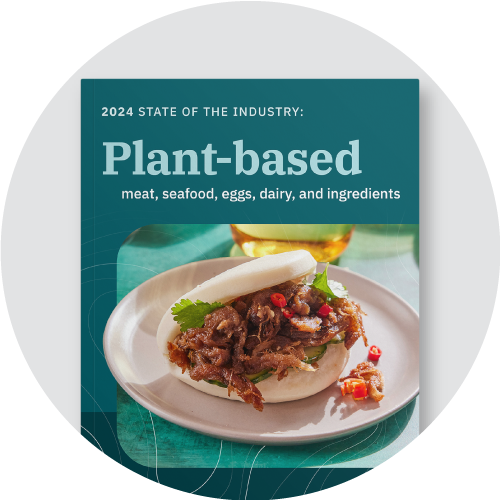
State of the Industry: Plant-based meat, seafood, eggs, dairy, and ingredients
This report highlights commercial landscape updates, retail and foodservice sales data, consumer insights, technical advancements, investments, and regulatory developments in the evolving plant-based foods industry.

Explore new data and industry insights
Executive summary
In 2024, the plant-based sector progressed in a myriad of ways, including innovative new product launches, a growing demand for plant-based eggs, and improved velocities (how fast items are turning over at shelf) across several plant-based categories. The scientific innovation ecosystem expanded with a notable investment of $90 million to launch three Bezos Centers for Sustainable Protein in the United States (North Carolina), London, and Singapore. New products launched, like plant-based whole-cut steaks and chicken breasts. And new plant-based manufacturing facilities opened across the dairy, meat, and ingredient categories.
At the same time, the sector continued to face challenges, including technical and cost hurdles, decreased private investments, and varying sales performance across global markets. Consumer research makes clear a major driver: some products do not currently meet consumers’ expectations for taste and price, and more work is required for companies to connect with consumers on the particular benefits of plant-based products, like health and sustainability.
As a sector still in its relatively early days and just nearing its potential, each year brings notable milestones across science, industry, and policy. These are among the notable advancements of 2024.
Report highlights
- New products and categories
- Retail and foodservice trends
- Industry partnerships
- Private investment insights
- Technical advancements
- Public investment and regulation
- Industry outlook
Key developments
This report provides a comprehensive global analysis of the evolving plant-based foods industry, including the commercial landscape, sales, consumer insights, trends in scientific innovation, regulatory developments, and public and private investments. Highlights featured in the report include:
Commercial landscape
Continued collaboration and innovation
- At least 26 total plant-based facilities opened, expanded, or were announced in 2024, including the retrofit of conventional protein facilities. Danone converted a conventional yogurt facility to plant-based yogurt production, while Lactalis Canada reopened a former dairy plant as a plant-based milk facility. Cocuus and Revo Foods opened 3D food printing facilities in Spain and Vienna. Irish shellfish producer Errigal Bay and New Zealand oat milk producer Otis each opened oat milk facilities in their respective countries.
- In the meat and seafood categories, Kraft Heinz introduced plant-based hot dogs and sausages as part of its joint venture with NotCo, Unilever’s The Vegetarian Butcher brand introduced new plant-based chicken and fish products in select European regions, and Nestlé debuted new ground plant-based meat products in Latin America and Africa. Dairy launches included Danone’s plant-based infant formula and yogurt products, Lactalis Canada’s new plant-based milk brand, and Bunge and Arla Foods’ plant-based butter products.
- New strategic partnerships: At least 13 partnerships were formed in the plant-based sector in 2024, with activity centering around plant-based meat product development, production technology, and plant-based dairy. For example, plant-based meat producer Steakholder Foods formed at least three partnerships centered around producing products using Steakholder’s 3D printing technology, including agreements with focuses on plant-based beef, fish, and regional cuisines.
Investments
All-time investment reaches $8.4 billion
- The three largest plant-based deals in 2024 were Heura’s $43 million, Oatside’s $35 million, and Plantible’s $30 million Series B rounds.
- The investment environment of the past two years has been fundamentally different from the low-interest-rate period before 2022, when the 30 largest rounds in privately held plant-based protein companies were raised.
- Privately held companies primarily involved in plant-based meat, seafood, eggs, or dairy have raised $8.4 billion since 2006, while publicly traded companies have secured $2.5 billion.
Science and technology
Continued ingredient and process innovation
- Faba beans have a favorable neutral taste, light color, high protein content (20%-25%), accessible genomics for straightforward breeding, and, like peas, are nitrogen-fixing pulses that benefit soil health. In 2024, Roquette, Bunge, and Wide Open Agriculture leveraged these benefits in their new faba bean protein isolates.
- New research centers and collaborations were announced across the globe, with a notable investment of $90 million by the Bezos Earth Fund. The funds were pledged to three Bezos Centers for Sustainable Protein at North Carolina State University, Imperial College London, and the National University of Singapore, which will bring stakeholders together across disciplines to develop and commercialize alternative proteins.
- In 2024, the world’s largest publicly available sensory analysis of plant-based meats was published by Food System Innovations’ NECTAR initiative, establishing new benchmarks for innovation and transparency in the sector. Most plant-based products still have room to win over consumers, but top performers in every category show what’s possible with more R&D, while the average plant-based nugget has already achieved taste parity with its animal-based counterpart. The study identified specific R&D areas in flavor, texture, and appearance for each of the five categories surveyed, with meatiness needed in all five.
Government and regulation
Increased support
- In January 2024, the Chilean Court of Appeals of Valdivia dismissed a lawsuit filed by the Association of Milk Producers of the Los Ríos Region, which sought to prevent Chilean plant-based dairy company NotCo from using the term “milk” on their plant-based beverages, which are labeled as “NotMilk.” The court of appeals found that NotCo’s plant-based milk label clearly states the product is not milk and is unlikely to confuse consumers who want to purchase cow’s milk, setting a valuable precedent for other plant-based products in Chile.
- In November 2024, the European Food Safety Authority Panel on Genetically Modified Organisms found Impossible Foods’ soy leghemoglobin to be safe for consumption. The ingredient is made from modified yeast using precision fermentation and is what lends the signature “bleeding” quality to their alternative protein products. The soy leghemoglobin is now pending final approval by the European Commission and the EU Member States.
- In January 2025, the U.S. Food and Drug Administration (FDA) released draft guidance on the Labeling of Plant-Based Alternatives to Animal-Derived Foods. The guidance would apply to plant-based meat, seafood, eggs, and dairy (other than milk, which was addressed separately by FDA in 2023). The draft guidance states that plant-based food labels can include the names of animal-derived foods, so long as the labels are not misleading.

Download our at-a-glance summary
Don’t have time to read the full report? Check out our summary for a quick view of the highlights and key data points from this report.
Hear from our experts
This webinar covers commercial landscape updates, retail and foodservice sales data, consumer insights, investments, technical advancements, and public funding in the evolving plant-based foods industry.
Find companies focused on plant-based meat, seafood, eggs, and dairy
These companies focus primarily on plant-based meat, seafood, eggs, and dairy. This database is dynamically updated; the total number of companies may differ slightly from what has been reported in the State of the Industry report as we continuously improve our dataset. This list is intended to be as comprehensive as possible, but should not be considered exhaustive. You can learn more about these companies in our company database.
Are we missing something? Let us know about an update to a company’s record by filling out our company database edits form or submitting a new company using this form.
Find plant-based meat, seafood, egg, and dairy production facilities
These production facilities have plant-based meat, seafood, egg, or dairy production capacity. This database is dynamically updated; the total number of facilities may differ slightly from what has been reported in the State of the Industry report as we continuously improve our dataset. This list is intended to be as comprehensive as possible, but should not be considered exhaustive.
Are we missing something? Let us know by filling out this form to add a plant-based meat, seafood, egg, dairy, or ingredient production facility to the database.

Page
The science of plant-based meat
Learn about the science of plant-based meat. Discover resources and research on the latest technological developments and key scientific questions.
More resources
Get fresh insights sent to your inbox!
The Alternative Protein Opportunity is a tool for food industry insiders and includes sales, consumer, and investment data as well as distribution, science, policy updates, and other timely insights. This newsletter is sent monthly. You’ll also receive bulletins about events, resources, and reports from GFI’s experts.
"*" indicates required fields


